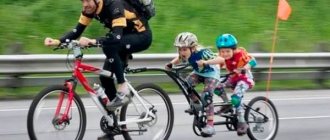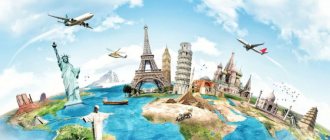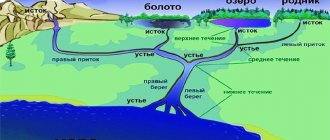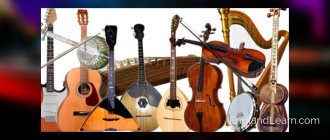Proverbs about travel in English: to travel hopefully is better than to arrive
It is no coincidence that the British have earned a reputation as conservative couch potatoes, openly skeptical of everything foreign.
“Island consciousness” and arrogant contempt for other countries and cultures at some point began to dominate the minds of young people from wealthy families so much that back in the 16th century it was decided to send them on the so-called “The Grand Tour” - a months-long journey through cultural centers Europe with a mandatory visit to Rome, Venice, Paris and Vienna.
Today, Brits make up one of the largest hitchhiking groups around the planet, highlighting how their relationship to the world “across the English Channel” has changed. The advice of experienced travelers is embodied in the sayings of a nation of discoverers and outstanding navigators.
- Youth likes to wander.
Literal translation: Young people are prone to wandering.
Meaning: In the UK, it is no coincidence that it is customary to take a “gap year” before entering university and devote it to travel. While a person is young and not burdened with family worries, he is open to the world and is ready to experience not only inconveniences along the way, but also unexpected adventures. However, the main thing is not to get carried away and change your location every month, because
- A rolling stone gathers no moss, but a sitting hen loses feathers.
Literal translation: A rolling stone will not grow moss, but a chicken that sits all the time will lose its feathers.
Analogue in Russian: The rolling loach will not make any good, but from a sedentary life the head goes bald.
In English there is an even more figurative proverb with a similar meaning:
- A tree often transplanted is never loaded with fruit.
Literal translation: A tree that is often replanted does not bear fruit.
Meaning: If you do not have a permanent shelter, it is impossible to arrange your personal life, maintain normal relationships with friends, or find a stable job. However, many young people are quite happy with this “tumbleweed” lifestyle, because otherwise the other extreme comes:
- Untraveled youths have ever been homely wits.
Literal translation: Young people who have not known travel always think in an ordinary and naive way.
Meaning: Many leave their home and set off towards the unknown with the desire to “expand their consciousness”, to create a global understanding of the world, and on such a journey it is important to be as attentive and focused on the current moment as possible, because:
- A traveler without observation is a bird without wings.
Literal translation: An unobservant traveler is like a bird without wings.
Meaning: Each new city is oversaturated with unknown smells, tastes, colors and sounds, you just need to tune in “on the same wavelength” with it and not be afraid to go far from the routes trodden by millions of tourists. Even if you are lost in an unfamiliar city, consider it part of the experience and a source of impressions, after all.
- The best journeys are not always in straight lines.
Literal translation: The best journeys do not take a direct route.
Meaning: However, some less adventurous Britons notice that:
- It is better to turn back than go astray.
Literal translation: It is better to turn back than to get lost.
And if you’re going to be careful when traveling, it’s important to be guided by a principle that applies not only when traveling:
- Who will go far must go slow.
- Who goes softly goes safely, and he that goes safely goes far.
Analogue in Russian: If you hurry, you will make people laugh.
With the advent of travel agencies, traveling across oceans and continents has become another service and has largely lost the spirit of adventure, which requires considerable stamina and endurance, but the British are still confident that:
- To travel safely through the world a man must have a falcon's eye, an ass's ears, an ape's face, a merchant's words, a camel's back, a hog's mouth, and a hart's legs.
Literal translation: To travel safely, one must have the sight of a falcon, the ears of a donkey, the face of a monkey, the persuasiveness of a merchant, the back of a camel, the mouth of a pig and the legs of a deer.
Next time you're abroad, take a closer look at British tourists and mentally check how they fit this image. By the way, this can be a great joke and a reason to start a conversation to test your spoken English, which you are learning so hard with our help.
IELTS academic writing task 1 traveling
Analyze the charts below, one of which shows the most popular countries for travel 2021 and the other illustrates the development of global tourism since 1950 until 2021. Summarize the information by selecting and reporting the main features, and make comparisons where relevant. You should spend about 20 minutes on this task.
English phrases in a taxi
- Where would you like to go? / Where do you wanna go? – Where would you like to go?
- Take me to this address, please. - Take me to this address, please.
- Buckle up, please. - Buckle up, please.
- How much will it cost? - How much is it?
- Could we stop at a cashpoint, please? – Could we stop at the ATM?
- How long will the journey take? – How long will the journey take?
- I need to go to St. Peter's station. – I need to go to St. Petersburg station
- Could you take me to the downtown, please? – Could you take me to the city center?
- May I open the window? – Can I open the window?
- Could you, please, slow down / throttle down! – Could you drive slower, please?
- Could you pull over to the shoulder, please - Could you pull over to the side of the road, please.
- I think you should take another lane. - I think you should move to another lane.
- Could you, please, close the window? - Could you close the window?
- How much is it? - How much do I owe?
- Would you like a receipt? - Would you like a check?
- Could I have a receipt, please? – Can I have a check, please?
- Could you pick me up here at 7 pm? – Could you pick me up from here at seven in the evening?
- Could you wait for me here, please? – Could you wait here for me?
Road signs and designations give way / Yield - give way speed limit: 60 - speed limit 60 mph (100 km/h) detour - detour traffic circle - roundabout no entry - no passage stop - stop one way - one-way road parking – parking no parking – parking is prohibited no stopping – do not stop keep left – keep to the left side get in lane – keep to the lane slow down – slow no overtaking – overtaking is prohibited low bridge – level crossing – railway crossing bus lane – bus lane no through road - no passage caution - attention fog - fog diversion - detour road closed - the road is closed roadworks - road work accident ahead - there is an accident ahead queue ahead - there is a traffic jam ahead queues after next junction - a traffic jam after the next intersection on tow - in tow services - zone rest no Littering – littering is prohibited. Fines from one and a half hundred dollars and above. litter Removal Next 1 Mile - litter removal over the next mile is carried out by one or another organization (mostly non-governmental (Suburban Exterminating), this gives them the right to place their logo on the sign, which is also a good advertisement) DUI (Driving under the Influence) – driving while intoxicated is prohibited (the sign indicates that you cannot afford this under any circumstances) no hitch hiking – hitchhiking is prohibited auto repair – car repair car wash – car wash
What time is it now? It's 9.00 – nine o'clock. 9.05 – five past nine. 9.10 – ten past nine. 9.15 – quarter past nine. 9.20 – twenty past nine. 9.25 – twenty-five past nine. 9.30 – half past nine. 9.35 – twenty-five to ten. 9.40 – twenty to ten. 9.45 – quarter to ten. 9.50 – ten to ten. 9.55 – five to ten. 10.00 – ten o'clock.
Speak English at the hotel
Now let's imagine such a situation. You just recently arrived in the country, took a taxi to your hotel, and now you need to check in. Let's imagine how this could happen. In the meantime, memorize useful English phrases for tourists in the hotel.
- I'm looking for a clean and cheap hotel room. – I need a clean and inexpensive hotel room.
- Have you any accommodation? - Do you have rooms available?
- Have you booked a room, sir? -Have you booked a room, Sir?
- I'm afraid, every room is taken. - I'm afraid we're all busy.
- What kind of room do you want? – What number do you need?
- I want a single/double room. – I need a single/double room.
- Will that suit you? – Will this suit you?
- I need a better room. - I need a better room.
- How long do you want to stay? – How long are you going to stay here?
- May I ask what the charge is? – How much does this room cost?
- Will you, please, fill in this form? – Please fill out this form.
- Your name? - Your name?
- Sign your name. - Subscribe.
- Your room is number 25, and here is your key. – Your room number is 25. Here are your keys.
- Will you show me up to my room, please? – Could you show me to my room?
Phrases in the hospital
We hope you don't need this. But it's still worth learning. You never know, anything can happen in life.
- I'd like to see a doctor. – I would like to see a doctor.
- Do you have an appointment? - Do you have an appointment?
- Is it urgent? - This is urgent?
- Do you have any doctors who speak Russian? Do you have doctors who speak Russian?
- Do you have private medical insurance? – Do you have health insurance?
- Please take a seat. - Sit down please.
- The doctor's ready to see you now. – The doctor is ready to see you now.
- What's the problem? - What is the problem?
- I've been feeling sick. - I was sick.
- I've been having headaches. - I had a headache.
- I've got diarrhoea. - I have diarrhea.
- I've got a lump. - I have a swelling.
- I've got a swollen ankle. - My ankle is swollen.
- I'm in a lot of pain. – I have very strong pain.
- I've got a pain in my back / chest. – I have back/chest pain.
- I think I've pulled a muscle in my leg. “I think I pulled a muscle in my leg.”
- I'm having difficulty breathing. – It’s hard for me to breathe
- I've been feeling very tired. – I feel very tired
- How long have you been feeling like this? – How long have you been feeling like this?
- Do you have any allergies? – Are you allergic to anything?
- I'm allergic to antibiotics. – I am allergic to antibiotics
- Are you on any sort of medication? – Are you taking any medications?
Filler words briefly - in short actually - actually in other words - in other words at all - generally nevertheless - nevertheless therefore - for this reason however - however otherwise - otherwise perhaps - possible
What are the benefits of traveling for local communities?
Tourism is the largest employer on the planet. They say that 1 of 11 people in the world work in tourism industry. This ranges from tour guides, hotel staff to coach services and restaurants. Retail and food production also benefit. The infrastructure improves, with new roads being built, parks developed and public places improved. Tourism helps the local residents to maintain their traditions and culture, while also showing it for all the visitors.
Tourism generated income can also be used on education.
- employer - employer
- it ranges from.. to... – is within the range from... to...
- retail - retail
- maintain traditions - preserve traditions
- showcase for visitors – demonstrate to visitors
What are the drawbacks of tourism for local communities?
Global tourism is destroying the environment and cultural identities.
Many tourist activities have negative ecological impacts , they deplete the local scenery . I read the other day that tourism can put pressure on natural resources and encourage over-consumption. This is particularly damaging in spots where resources like food and water are already scarce.
The commercialization of culture can undermine the soul of a tourist destination. Local traditions that have rich cultural heritage are reduced to wearing costumes and putting on acts for the tourists in return for money. For instance, Venice, with a population of 55, ooo is visited by 30 million a year! It maybe placed on Unesco's list of endangered heritage sites .
Tourists often lack respect for local traditions and culture, refuse to follow local dress standards, get drunk in public or behave rudely or inappropriately towards locals.
Tourism jobs are quite commonly seasonal and insecure , without extra benefits such as pensions, sick pay or healthcare.
The cost of living is affected by tourism especially by short-term-let companies such as Airbnb, which drive up housing costs . The problem shows itself in both supply and demand. There isn't enough room for so many people to walk through tourist destinations. But the number of people wanting to visit them is rising all the time, fed by greater global prosperity, cheaper air travel and increased overall provision of hotels worldwide.
Tourism has changed neighbourhoods, with most landlords opting to rent out their properties to tourism service providers. Many streets and alleyways are simply too narrow to allow large crowds of people to pass. Many local barber's and therapist consultancies dissapeared and turned into souvernir's shops.
The commodification of what should be revered as unique is happening everywhere. Tourists rarely get the chance to stand in awesome and wonder. Visitors cause land, food, water, housing and infrastructure prices to increase. Sadly, more tourism often means less benefit to the host communities.
- negative ecological impacts - negative impact on the environment
- deplete the local scenery – deplete local scenery
- put pressure on natural resources – put pressure on natural resources
- encourage over-consumption - encourage over-consumption
- particularly - especially
- spots - places
- scarce – scanty
- commercialization of culture – commercialization of culture
- undermine - undermine
- soul- soul
- rich cultural heritage - rich cultural heritage
- local traditions are reduced to wearing costumes - local traditions are reduced to wearing costumes
- put on acts for tourists in return for money
- tourists often lack respect for local traditions – travelers often lack respect for local traditions
- they refuse to follow local dress standards - they refuse to follow local dress standards
- get drunk in public - get drunk in public
- behave rudely - behave rudely
- inappropriately - inappropriately
- insecure - unsafe
- the cost of living is inflicted by tourism – the price of housing is imposed by the tourism business
- short-term-let companies – short-term rental companies
- drive up housing costs – increase housing prices
- revered - revered
- revere - to revere, revere
- unique - unique
- stand in awe - to be in awe










